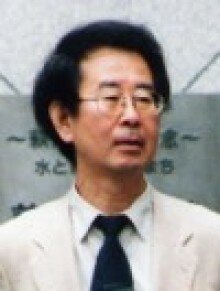
Yukio Tsuji was born in downtown Tokyo in 1939. He grew up there without seeing his father, who had been drafted and sent to China during the second world war, until he was 4 years old. When he was 7, his family moved to Miyake Island, 180 km off the coast from Tokyo, where they stayed for 3 years. There, he spent much of his time swimming in the Pacific Ocean and dreaming of becoming a sailor, an ambition he later had to abandon because of his short-sightedness. Back in Tokyo, aged 15 and passionate about Tanka poet, Takuboku Ishikawa and Rainer Maria Rilke, he decided to become a poet instead. His first book of poetry, Gakkoh no Omoide (The School Memories) came out in 1962.
Tsuji joined Shichosha, a major Tokyo poetry publishing house, in 1966 as an editor and launched “Gendaishi Bunko”, an epoch-making series of anthologies of contemporary poetry, which now counts 181 volumes (the latest happens to be the third selection of Tsuji’s own poems) and is still growing. Aged 30 year, however, he quit his job, and became an office worker for the Tokyo Public Housing Corporation, because, as a writer (albeit not so widely recognized then), he wanted to distance himself from editing and publishing. After writing more than 15 books of poetry, 5 books of essays, and numerous short stories and Haiku, he died in 2000, at the age of 60. He was survived by his wife and two daughters.
Yukio Tsuji had a unique presence amongst post-war Japanese poets in many ways. Firstly, he was the only one to almost unabashedly embrace emotions and lyricism in his poetry, whereas his contemporaries obstinately refused to do so for the sake of modernity and criticism. In one interview, he said, “so-called modern poetry has gotten poorer as a result of such suppression of emotional expression. I didn't block my emotion, I would just let it go, let it flow. After all, we are not building a dam, but poetry.” Secondly, he stood out from his po-faced contemporaries with his sense of humor; one can always find a touch of dry humor in his poems, and this saves them from becoming too sentimental or self-indulgent. Thirdly, he was open to both Japanese literary traditions, especially Haiku, and Western literatary traditions, and he was not afraid to let his own poetry be influenced and enriched by them. A Western influence is manifest in the titles of poems such as ‘In the Margin of Verlaine’, ‘Reading Raymond Carver’, ‘From the Late Autumn Tokyo after John Donne’, ‘Chekhof Poems’, to name but a few. His 1996 Haikai Tsuji Poems was a delightful attempt to integrate the traditional Haiku into modern free verse, winning him two prestigious awards. All of these unique qualities seem to stem from his determination to broaden the spectrum of modern Japanese poetry and make it more appealing to general audiences.
Audio Feature
You can listen to readings of the poems in Japanese (by the author) and in English (read by Don Mueller). Click on the green icons on the poem pages.
Bibliography
Poetry
Gakko no Omoide (The School Memories), Sichosha, 1962
Imawa Ginyuh Shijin (Now I’m a Minstrel), Shichosha, 1970
Sumidagawa made (Up to The Sumida River), Shichosha, 1977
Rakujitsu (Sunset), Shichosha, 1979
Gendaishi Bunko Tsuji Yukio Shishuh (Sellected Poems), Shichosha, 1982
Tenshi, Choh, Shiroi Kumo nado ikutsukano Meisoh (A Few Meditations on Angels, Butterflies, White Clouds, and so on), Shoshi Yamada, 1987
Kaze no Hikikata (How to Catch a Cold), Shoshi Yamada, 1987
Uguisu - Kodomo to Samurai no 16 Hen (Warbler: 16 Pieces on Children and Samurais), Shoshi Yamada, 1990
Verlaine no Yoyaku ni (In the Margin of Verlaine), Shichosha 1990
Boat wo kogu Obasan no Shozo (The Portrait of Aunt Who Rows a Boat), Shoshi Yamada, 1992
Kakoh Chohboh (Views over the Estuary), Shoshi Yamada, 1993
Tsuji Yukio Shi Shuhsei (Collected Poems), Shoshi Yamada, 1996
Haikai Tsuji Shishuh (Haikai). Shichosha, 1996
Moeizuru Wakaba ni Taiji shite (Facing against the Young Leaves Shooting), Shichosa, 1998
Funade (Selected Poems), Dohwaya, 1999
Boat wo kogu mou Hitori no Fujin no Shozoh (The Portrait of Another Woman Who Rows a Boat), Shoshi Yamada, 1999
Selected Poems, Geirin Shoboh, 2003
Mizu wa Tsumetai (Selected Poems). Rironsha, 2004
Essays
Robinson, Kono Shi wa Nani? (Robinson, What is this Poem?), Shoshi Yamada, 1988
Kantan na Konton (Easy Chaos), Shichosha, 1991
Gauche no Shozoh (The Portrait of Gauche), Shoshi Yamada, 2002
Shi no Hanashi wo siyou (Let’s Talk about Poetry), Midnightpress, 2003
Watashi no Gendaishi Nyuhmon (My Introduction to the Modern Poetry), Shichosha, 2005
Other Works
Ehon Matenroh Monogatari (Picture Book: Skyscrapers Stories), Shoshi Yamada, 1995
Bokutachi no (Manaita no youna) Kenjyu (Short Stories: Our Chopping-Board Pistol), Shinchosha, 1999
Kamotsusen Kushu (Selected Haiku: Cargo Ship), Shoshi Yamada, 2001





